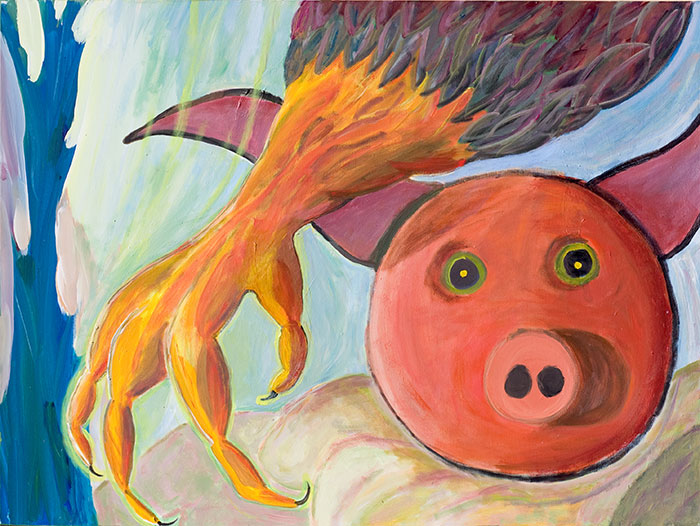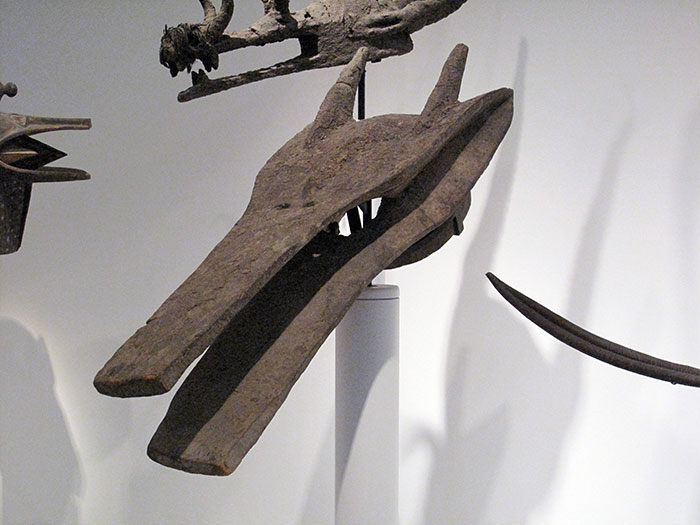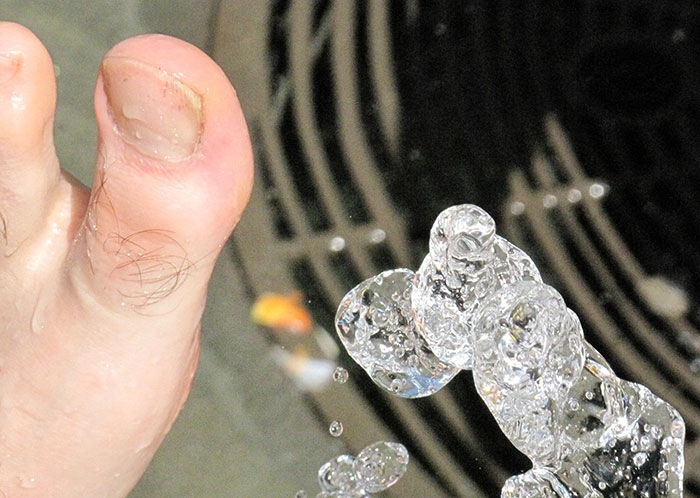
Bad Ideas
by Rudy Rucker

One rainy, early-dark January evening, Bea Malo was sitting on a rickety couch in the tiny living-room of the cottage near San Francisco that she and her husband Nils Mundal rented. She was drinking a cup of chamomile tea, watching a broadcast of a ballet, relaxing from her day at work, letting her mind drift with the music and the shapes. The room was cozy from the wood-burning stove.
Bea freelanced as a Spanish-English interpreter for the state courts, mostly working with deportation cases. She was fond of her clients, but not of the lawyers—in general she disliked officials of any kind. They frightened her. A mean dancer with a bone-white face chased the ingénue across the screen.
Bea’s Wyoming rancher parents hadn’t spoken Spanish—far from it. She’d learned the language at college, and then from living in Seville for a year. She’d fantasized that she might find her way into the bright little world of flamenco dancing, that charmed eggshell of scorn and abandon. She’d made some inroads—she was beautiful, bright, sensitive. But she’d been thrown off-stride by an unexpected pregnancy.
She’d fled home to the ranch for help, somehow forgetting just how judgmental her parents were. Dourly, they watched Bea reach her term and give birth in her old bedroom at the ranch. The golden afternoon hour of her son’ s delivery had been lovely—Bea had felt like a star in a Fellini movie, with the radio’s tinkling sounding like a worldly Nina Rota score. But a week later, she’d given the boy up for adoption. She was, when it came down to it, unwilling to try and make it as a single mother.
Readily forgiving herself, and out for more adventure, Bea became a cross-country skier, drifting across the Western states, working low-end jobs, spending her free hours on winding forest trails, loving the rhythm of the path. She met Nils while waitressing at a Nordic ski resort in Montana—Nils was a low-paid guide, a recent immigrant from Finland. For Bea he came as a relief from the penny-pinching resort owners and the yuppie guests. Nils had hardly gone to school, and he’d never learned proper English. It didn’t matter. He was a wonderful man with a brilliant soul, tall and lanky with a friendly mustache.
The rain drummed on the roof, the fire hissed in the stove. The dancers on the screen capered to the beat, their limbs like crooked worms. Bea moved her arms gently with the music, dancing the flow of her thoughts, remembering the very first ski that she and Nils had taken together, one evening in Montana, the time they’d fallen in love.
Just then the man himself emerged from the bedroom, where they kept their computer. These days Nils liked pricing things like music-players, bicycles, and power tools online. Tonight he was obsessed with a particular second-hand camera. He described some of the device’s enticing qualities, none of which made any sense to Bea.
“I think this camera is a very good one,” concluded Nils, his voice rising with his same old enthusiasm.
“You should watch this ballet with me,” said Bea. “It’s wonderful. Look how the woman in white is spinning from one encounter to the next.”
Nils sat with Bea for a few minutes, exclaiming over the height of the dancers’ leaps. But soon he grew impatient. Despite his inner spiritual qualities, he’d never been any kind of intellectual. He made his way back to the computer.
He probably wouldn’t buy the camera anyway. Tomorrow he’d be onto something else. The only things he’d actually purchased this year were a pair of nearly identical beige Mazda cars, each with hundreds of thousands of miles on its odometer. Nils thought the first car was such a great deal that he’d immediately gotten the second, arguing that whichever of the twin cars broke down first could be a parts-bank for the other. No matter. He made a good salary these days, working in a high-tech shop that built machines for making machines. He didn’t understand the science, but he had genius-level hands.

The onscreen ballet dancers spun and gestured. There was something increasingly odd about the lighting, an obtrusive flickering that made Bea’s eyes twitch. Beset by crackles, the music was rising and falling in a ticklish, irregular beat. The show was making Bea dizzy.
“The TV is breaking,” she wailed. “Can you fix it, Nils? Is it the cable wire?”
“My computer is going screwy, too,” replied Nils, his voice soft in the next room. “I see everything is flashing and whirling like...” He trailed off.
And by now Bea was speechless too. The television screen’s image had become a whirlpool spinning inwards from the edges, absorbing her entire attention. She saw a vision. She was skiing though the woods at dusk, among totem poles that reached to the heavens, the graven faces watching her in solemn disapproval. Like her parents. She felt herself as dirty, ragged, a blot upon the hill’s smooth curves. Beams were streaming from the totems’ eyes, punching into her like pins into a cushion, the delicate points knitting a design within her skull.
The pattern grew, unfolded, took on life—and suddenly Bea felt a new capability within herself. She—she could turn her thoughts into visible objects. All the steps were somehow clear.
And now the ghostly totems began telling her to cleanse herself, to spit out her bad ideas. All right. So what was her worst garbage? Bea had always worried she was too timid. Okay then, why not do something about it? With a wide-eyed grimace and a whoop, Bea expelled—something.
Her vision cleared. The totems had receded into the background. She was in her living-room. The TV screen was intensely black. And creeping across the rug at her feet was—a cringing little orchid flower, pink and lavender, making soft weeping noises. Immediately she knew it to be her timidity. Her whole intricate neurosis had been externalized and concretized into this wretched little thing.
Wanting to be done with her weakness for once and for all, Bea snatched up the twitching petals. The flower was slippery and tingly; it moaned louder than before. She almost felt sorry for it. But, no, said the ghostly totems. She had to go through with this. She crushed the orchid of timidity into a dead, mute bean, and threw it into the woodpile by the stove.
“That’s amazing,” said Nils, standing in the bedroom door, somehow understanding exactly what Bea had done.
“Do you see it too, Nils? The totem poles? Can you make thoughts?” She could feel that her strange new power was still active.
“I see the Northern Lights,” he said slowly. “They’re teaching me something.”
“Get rid of the things you don’t like,” urged Bea. For a moment she wondered what was happening to her. But the changes were so fast and exciting that there was no time to think. And Nils was in on it too. It was as if the two of them were in the Montana Rockies again, schussing though a steep forest with the dawn sky all joyous patches of blue and gold.
“I want to get rid of my father,” said Nils. “He was really crazy, you know. I’d like to forget him for good.”
“Do it,” said Bea.
Nils flipped one of his long-fingered hands as if shaking off water. A gnarled little old man appeared on the floor, the size of a thumb—angrily shaking a tiny fist.
“I hate you for beating me!” said Nils, leaning over the icon of his father. Taking out a pocketknife, he chopped the shrilly shrieking figure into scraps—and the pieces melted into a puddle of something darker and shinier than blood.
“Serves him right,” said Bea, in case Nils was feeling guilty.
“Who?” said Nils. “What’s happened?”
The lust for cleansing was still upon Bea. “I’ll kill the horrible bogeyman God that my parents bullied me with!” she cried.
Focusing her attention inward as if crossing her eyes, she expelled a form from the center of her forehead. It plopped to the floor, a green transparent pyramid with a yellow eye glowing in its center, and a little gray beard trailing from one corner. Stupid old Jehovah. Bea stomped on him as if crushing a roach. And in that moment all her hateful memories of childhood religion were gone.
“I have too much computer junk in me,” said Nils. He leaned forward, opening his mouth as if vomiting, and out streamed a mound of gizmos and doohickeys, all winking lights and gears and chips. Mouth wide open, Nils retched again—and here came a rush of, oh my, lubricious naked figures, vulgar little women with their legs spread like Y’s.
Bea opened the door of their wood stove, and shoveled the nasty things into the flames. They screamed and writhed like the damned souls of a medieval Hell.
Not liking her jealousy over the porno women, Bea spit that out too—a fat green toad with eyes all over it. She drowned it in the sink. Nils spit out the jabbering monkey of his restlessness and tore it limb from limb. Bea threw her fear of death into the food-processor, and ground the little skeleton into twinkling dust. On and on went Nils and Bea, laughing and sobbing by turns.
Somewhere in this frenzy of self-annihilation, Bea found the presence of mind to save off her special memory of that one particular Montana dawn when she and Nils had gone off together to ski before the day’s duties . That’s when their real lives had begun. The icon took the form of a tiny man and woman on skis, holding hands, like a minute Christmas tree ornament. She nestled the amulet among the sachets of chamomile tea in her kitchen drawer. This moment, above all, was to be treasured. It was the key.
And then it was back to wild demolition of her personality. By midnight, Bea and Nils were quite blank. They undressed and dreamlessly slept. In the morning they mechanically ate food from the fridge, and all day they sat naked on the couch, gazing at the TV’s dead screen. Nobody phoned, nobody stopped by—if Bea had been in a mood for thought, she might have deduced that the cleansing plague had hit their neighbors too. But on this day she wasn’t thinking at all.
It was pleasant, sitting with the nice-smelling man beside her. Now and then they got up and stretched, took food from the fridge, or used the bathroom. Once they had sex, as if testing it out. Late that afternoon, the electrical wires outside began shaking, and a humming issued from the walls.
“Here comes more,” said Bea, quite unafraid.

With a chirp and a chitter, a pair of slugs writhed out of the nearest electrical socket. The first one crawled up Bea’s bare leg, the other one up Nils’s. Despite the cold, Nils and Bea were still naked. The little glob left a tingling trail upon Bea’s skin. She sensed that the thing was filled with information, much like the little icons that she and Nils had been decimating last night.
But Bea didn’t feel any urge to kill this particular slug. The totem poles—never quite absent from her mind —were telling her that the wriggler was filled with wonderful things. Bea wondered if it might teach her to be a ballerina, or remake her into a great painter. She watched the shiny creature crawl as far as her navel—whereupon it pirouetted and sank into her skin. Meanwhile Nils was letting the other slug merge into him.
Bad idea, bad idea.
As soon as Bea had welcomed in the mind parasite—for this is what it was—she was filled with strange, unaccustomed thoughts. She wanted a second television and a bigger car. She wanted to campaign against taxes on the rich. She wanted to burn the local college. She wanted to saw down all the trees.
She talked this over with Nils—and on every point, they agreed. Really, they didn’t even need to use words. Making noises was enough. Stepping outside into the twilight , prepared to change the world, they found that their neighbors, too, had annihilated their personalities and taken on mind parasites. People were standing around like living statues.
Corky, the big man who lived next door, ambled over to discuss strategies.
“Gabble gabble,” he said.
“Gibble gibble gibble,” responded Bea, shivering a little against the January chill.
“Gabble gibble gubble gore,” said Nils, putting his arm around her.
And thus it was agreed that, on the morrow, they’d set out as a group and kill any people who’d managed to resist conversion.
Bea was okay with the plan—but right now she was more focused on going inside and putting on pants and a sweater. Nils dressed with her, but he seemed uneasy. He went back out and bumbled around the yard in the waning light—first raking the dead plants from the garden, then getting out his beloved tools to try repairing a rotten bench in the yard. Meanwhile Bea built a fire. When it was quite dark, Nils came in and made them some chamomile tea.
Handing Bea her cup, Nils had a goofy smile on his face, his first of the day. “We go way back together,” he said.
“Yes, yes,” said Bea, not knowing what he meant.
Nils tried to talk to her about old times—something about skiing in Montana—but Bea couldn’t focus. She was more interested in staring into the flames, peacefully savoring the emptiness in her head.
“I don’t feel right,” said Nils after a bit. “I feel like I’m coming apart.”
Bea had no response. Finally, irked and unsettled, Nils went to bed alone.
It was past midnight when Bea awoke. The fire was down to a few coals. The kitchen lamp glowed. She’d fallen asleep on the couch. Nils was tugging at her, squeezing her left hand. But why didn’t she see him?
Bea sat up, with Nils still grasping her hand—and now, clearing away the cobwebs of sleep, she saw that it wasn’t really Nils holding her, or not all of him. An arm was lying on the couch beside her, Nils’s right arm, his hand clamped onto hers, and with—how freaky—a pale blue eye in the back of his hand.
She screamed and jumped to her feet. The bumpy, crooked snake of Nils’s arm coiled back and raised its hand like a cobra head.
“It’s me,” the thing hissed, the thumb and fingers moving as if in a shadow play. The voice issued from a little slit in the palm of the hand. “It’s me, your husband Nils. Your memory, Bea—it healed me. I found it in the tea drawer. But the Northern Lights kept trying to crush me. I had to split off. We have power, Bea. More power than we know.”
The totems in Bea’s head drove her to grab the poker. She raised it high, and swung at the skanky arm. But Nils had always been faster and smoother than her. His arm leapt into the air and twisted the poker from her grip. Landing across her shoulders, the arm coiled around her neck and pushed the palm’s slit-mouth against her lips.
Two tiny pairs of skis slid across Bea’s tongue—and everything changed. Once again she was gliding among dawn-gilded trees, with her whole life ahead of her. Once again, she was in love with Nils.
The totems lurking among the trees burst into flame, trying to destroy her vision.
She shook her head, trying to clear her eyes. A heavy thump sounded in the bedroom. The one-armed body that had once been her husband’s was rising from its mindless slumber to attack.
“Come,” hissed the narrow mouth in Nils’s palm. “Come away with me. We can save ourselves. Maybe save the world.”
Staving off the totems in her head, Bea moved her true self down into her left arm. This was as large a volume as she could fully control. Projecting with all the power of her altered mind, she gave the arm an eye, a mouth, an ear, a digestive tract. And then she pinched it free, leaving the parasites behind.
With a thump, Bea’s arm hit the floor beside Nils’s. While Nils yanked the footing under their enslaved old bodies, Bea bucked up onto her shoulder joint and got the front door open.
Moving fast, the couple snaked off into the night.
About the Author

Rudy Rucker is a writer and a mathematician who worked for twenty years as a Silicon Valley computer science professor. He is regarded as contemporary master of science-fiction, and received the Philip K. Dick award twice. His thirty published books include both novels and non-fiction books. His most recent pair of novels, Postsingular and Hylozoic, describe a near-future Earth in which every object becomes conscious.
Please mention the author or this piece's name in your comment.